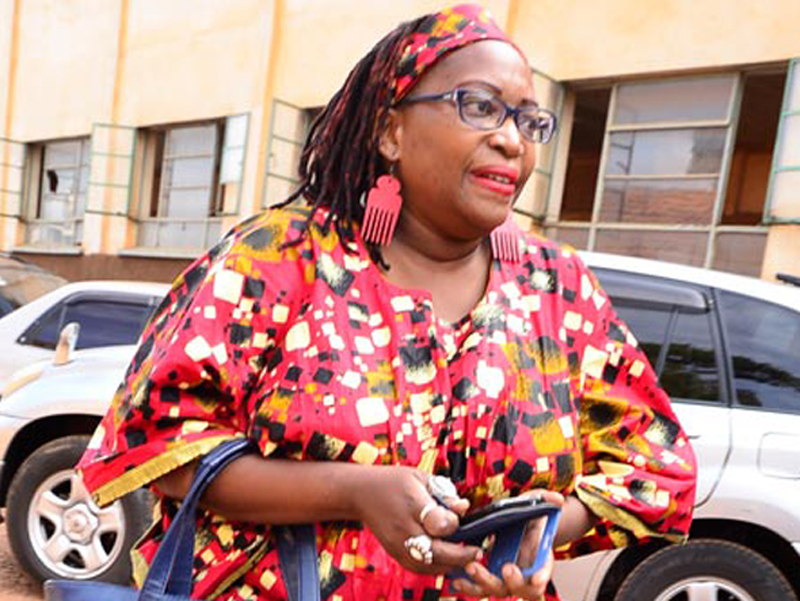Editor
Stell Nyanzi remanded to Luzira for calling Museveni “a pair of buttocks”

Dr Stella Nyazi while appearing at the CID headquarters in Kibuli, Kampala recently.
Dr Stella Nyanzi has been remanded to Luzira prison until April 25 when court will hear her response to the State application to have her mental status checked and to hear her bail application. Her arrest and detention has attracted condemnation from local and international organisations, as a violation of her human rights to freedom of expression.
Buganda Road Court Chief Magistrate Jamed Eremye on Monday evening ruled that Dr Nyanzi should answer to the charges against her, before the State application is considered.
She was subsequently charged and pleaded not guilty to the two counts of cyber harassment and offensive communication.
The State accuses Dr Nyanzi of, among others, referring to President Musevni as “a pair of buttocks”.
In a charge sheet presented before the Buganda Road Chief Magistrates Court, the State said Dr Nyanzi’s reference to the President was not only obscene but also indecent contrary to the Cyber Harassment of the Computer Misuse Act 2011.
The State also accuses Dr Nyanzi of disturbing the “peace, quiet or privacy” of the President after she “willfully and repeatedly used electronic communication to post messages offensive in nature via Facebook” contrary to the Offensive Communication of the Computer Misuse Act 2011.
Police, last Friday, arrested Dr Nyanzi as she left Mackinnon Suites Hotel in Nakasero, where she had been invited to give a keynote address to Rotarians on the subject of menstruation.
But his lawyers and other human rights organisations dismissed the state claims against Nyanzi insisting that Nyanzi was simply enjoying her constitutionally guaranteed freedom to expression.
The US-based African Studies Association, released a statement condemning the arrest of Dr. Nnyanzi. The statement signed by the body’s Board of Directors noted thus:
“The ASA is concerned about the detention of Makerere scholar Stella Nyanzi, who is being held on remand on charges of ‘cyber harassment’, for disturbing the ‘peace, quiet or right to privacy’ of the President, and for ‘obscene and indecent’ speech. Dr. Nyanzi was a 2013 Presidential Fellow of this Association.
“Provocative speech has a long, distinguished, and inspirational history in Uganda’s public life. In 1945 and again in 1949 Uganda’s earliest nationalists—among them the trade unionist Ignatius Musazi and the provocateur Semakula Mutumba—criticised British colonial government in extremely intemperate language.”
‘Dr. Nyanzi’s posts on Facebook and other media stand in this same tradition. They may be considered by many as intemperate and objectionable. But we urge you to rise above the fray and to respond, not by imprisoning Dr. Nyanzi, but by taking the substance of her argument seriously. Democracies function best when leaders of public opinion are given space and opportunity to express discontent. Free expression of opinion can sometimes be offensive. But—as Uganda’s own history shows—it is by free expression that a more just and more open society can be established.”
The African Centre for Media Excellence (ACME) also called on government to drop criminal charges against Dr. Nyanzi.
ACME’s Executive Director Dr. Peter Mwesige said in a statement that:
“While we recognise that the colourful language that Dr Nyanzi sometimes uses could in some cases go against certain community standards and offend sections of the population, we call upon the authorities to take a broader view of protected speech.”
As a champion of journalistic excellence, ACME promotes professional journalism that tends to privilege “acceptable” language and speech.
“However, we are always mindful that the right to freedom of expression, which is guaranteed by our Constitution, is in fact for all citizens not just (professional) journalists,” added Dr Mwesige.
“Also, that expression extends to all manner of ideas, opinions, and information, including those that the majority may find offensive or even illegitimate.”
Comments



















